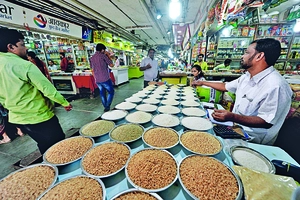Retail price inflation fell to a three-month low. The rate was 6.77% in October, central statistics released on Monday showed. In September it was 7 points to 41%. Some relief in prices has returned in the wholesale market as well. Inflation there fell below 10 percent after 19 months to 8.39 percent last month. The finance ministry claimed that the government’s move to curb commodity prices and the fall in food prices were the reasons for the “significant decline” in retail price inflation. However, the question of the concerned circles, this rate fell to 6.71 percent in July as well.
But the next two months rode. There is still a long way to go to reach the 6% tolerance limit set by the Reserve Bank. On top of that, the price increase of food products is more than seven percent. Petrol, diesel, and cooking gas prices are quite high. As a result, there is no reason to think that anxiety has completely subsided.
Interest rate fixing policy

The Reserve Bank fixes interest rates with an eye on increasing retail prices. Because the price here affects the buyer’s pocket. After the October figures come out, many believe that the pace of interest rate hikes will slow down this time. As a result, the cost of borrowing will not increase by leaps and there is some relief in the industrial sector as well.
According to the statistics office, the price increase of food products was 7.01 percent last month. Much lower than September’s 8.6 percent. However, some experts claim that 7% is high enough. Can’t be said to be comfortable for people. They also think that there is no sign of relief in the market.
However, the finance ministry claimed in various of tweets that prices of commodities such as crude oil, steel and iron ore have gone down in the global market. Added to this are measures such as tariff cuts by the Center to increase supply in the country. This has helped curb retail price inflation overall. “Furthermore, the government took several trade-related measures to stabilize the domestic supply of rice and wheat and bring down rising costs. The effect of which will be better felt in the months that are coming,” the ministry said.
According to experts, the decline in price growth is a good sign. It’s a relief. But the war is still going on. Fear of recession in Europe. Supply chain issues also persist. As a result, it is not possible to say whether this relief is long-lasting.
More details
• Retail price inflation fell below seven percent last month but is still above the Reserve Bank’s tolerance limit of 6 percent.
• For 10 consecutive months, this rate has been higher than the target.
• Even though the price of fuel in the country has not decreased yet.
• The price of food products in the retail market has also increased at a rate of more than seven percent. Especially in villages, as it increases at the rate of 7.30 percent, the fear is increasing.
